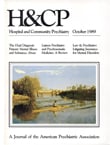Substance Abuse Among the Chronic Mentally Ill
Abstract
Substance abuse was examined in a group of 187 chronic mentally ill patients living in the community. According to ratings by aftercare clinicians, approximately one-third of the sample ahused alcohol, street drugs, or both during the six months before evaluation. Patients who were dually diagnosed with substance abuse and mental illness differed from those with mental illness alone in several respects: they were younger and more often male; were less able to manage their lives in the community in terms of maintaining regular meals, adequate finances, stable housing, and regular activities; showed greater hostility, suicidality, and speech disorganization; and had poorer medication compliance. In addition, they were nearly twice as likely to be rehospitalized during one-year follow-up. Substance abuse appeared to add the problems of disruptive, disinhibited, noncompliant behaviors to chronic mental illness.
Access content
To read the fulltext, please use one of the options below to sign in or purchase access.- Personal login
- Institutional Login
- Sign in via OpenAthens
- Register for access
-
Please login/register if you wish to pair your device and check access availability.
Not a subscriber?
PsychiatryOnline subscription options offer access to the DSM-5 library, books, journals, CME, and patient resources. This all-in-one virtual library provides psychiatrists and mental health professionals with key resources for diagnosis, treatment, research, and professional development.
Need more help? PsychiatryOnline Customer Service may be reached by emailing [email protected] or by calling 800-368-5777 (in the U.S.) or 703-907-7322 (outside the U.S.).



